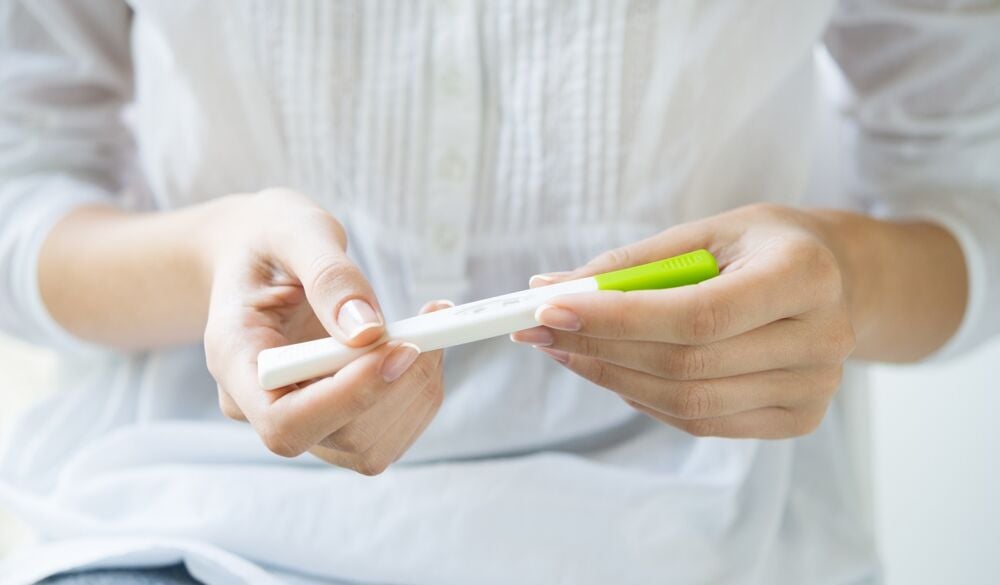Having a late period might come as a surprise, especially if you’re not trying to get pregnant. Should you take a pregnancy test? The truth is, there are many reasons for late periods other than pregnancy. Your health, age, diet, stress, and exercise can all affect the regularity of your menstrual cycle. In this article, we’ll look at the most common late period causes and go over some common questions about delayed menstruation.
-
Tracking cycle
-
Getting pregnant
-
Pregnancy
-
Help Center
-
Flo for Partners
-
Anonymous Mode
-
Flo app reviews
-
Flo Premium New
-
Secret Chats New
-
Symptom Checker New
-
Your cycle
-
Health 360°
-
Getting pregnant
-
Pregnancy
-
Being a mom
-
LGBTQ+
-
Quizzes
-
Ovulation calculator
-
hCG calculator
-
Pregnancy test calculator
-
Menstrual cycle calculator
-
Period calculator
-
Implantation calculator
-
Pregnancy weeks to months calculator
-
Pregnancy due date calculator
-
IVF and FET due date calculator
-
Due date calculator by ultrasound
-
Medical Affairs
-
Science & Research
-
Pass It On Project New
-
Privacy Portal
-
Press Center
-
Flo Accuracy
-
Careers
-
Contact Us
Late Period: Everything You Need to Know

Every piece of content at Flo Health adheres to the highest editorial standards for language, style, and medical accuracy. To learn what we do to deliver the best health and lifestyle insights to you, check out our content review principles.
My period is late: is there any reason to be worried?
It's the question many of us have wanted to know the answer to at some point or another: How late can a period be without being pregnant? If you're someone who uses a period calculator to predict their next bleed, and you're not actively trying to get pregnant, it's safe to say it can be... alarming if it doesn't turn up on time.
But it might comfort you to know that numerous studies show that a slight variation in the length of your menstrual tracking cycle is normal. More than 100 women with average menstrual cycle lengths (between 21 and 35 days) took part in a large-scale study that showed interesting results: cycle variability of more than seven days was observed in 42.5 percent of the participants! As you can see, a one to two-day variation is very common.
Another large study conducted by Flo and the University of Adelaide showed that only about 16 percent of the participants had a 28-day cycle, even though you might have been told this was the typical length for menstrual cycles.
A late period under 16
Many teenagers want to know why their period is late. For many, the first few years of menstruation involve irregular periods.
The body is still developing in this stage of life, and a teen’s ovaries do not always release an egg monthly. This may result in irregular cycles — fewer than 20 or more than 45 days. A typical cycle for teenagers lasts between 21 and 45 days.
Having fluctuating periods for two years or less during adolescence is likely nothing to worry about. Your health care provider can conduct a physical exam to make sure everything’s healthy. Teens’ cycles start to regulate as their hormone levels stabilize, although some will still have irregular cycles on an ongoing basis.
Continue monitoring your body. When your period comes, use Flo to log the date and your symptoms. The app can help you better predict your period, even if you have an irregular cycle.
late period pregnancy test

Having irregular cycle?
Log your cycle and symptoms to see your cycle trends. Get access to a library of medically reviewed articles.
Take a quiz
Find out what you can do with our Health Assistant

Is a late period reason to take a pregnancy test?
There are many reasons for a late period besides pregnancy. When you stop having periods, it could be related to lifestyle factors such as stress, a strict diet, or extensive physical activity.
It might also result from the use of birth control pills, various diseases, hormonal abnormalities, or problems with your reproductive organs. Finally, it could be due to pregnancy.
Home pregnancy tests allow you to determine if you’re pregnant at a very early stage. These tests detect the presence of the pregnancy hormone called human chorionic gonadotropin (hCG) in your urine. Your body makes this hormone when a fertilized egg is implanted in your uterus.
Is your period five days late or more? Take the test for the most accurate results. Some tests might be more sensitive than others.
Reasons for a late period: what might they be?
If your period is five days late, it doesn’t necessarily mean you’re pregnant. There are multiple factors that can cause your period to be late:
- Physiological — Stress, sudden weight changes, climate or time zone changes, breastfeeding (lactational amenorrhea), etc.
- Medically induced — Associated with taking or stopping medications including hormonal contraceptives and antidepressants
- Pathological — Caused by diseases such as ovarian pathology, uterine diseases, endocrine system disorders, etc.

Your mental health is important
Our built-in Health Assistant will help you understand your symptoms and look after your mental health.

Low body weight
Excessively low body weight — weight that is about 10 percent below normal — interrupts many hormonal functions in your body, which can cause ovulation and menstruation to stop.
People who have an eating disorder, such as anorexia or bulimia, often have delayed periods because of these abnormal hormonal changes.
Exercise
Doing physical activities that require rigorous training, combined with other factors, such as low body fat, stress, and high energy expenditure, may disrupt your menstrual cycle. Don’t forget to add workouts and other physical activity in Flo; it will make the prediction of your menstrual cycle and ovulation more accurate.
It’s important to remember that if your period is more than five days late, you should consult your health care provider.
Frequently asked questions about late periods
Can you miss a period and not be pregnant?
Yes! Pregnancy isn’t the only thing that can cause a missed period. Hormonal imbalances, such as those caused by polycystic ovary syndrome or follicular cysts, can make you miss your period. Stress, hormonal birth control, excessive exercise, malnutrition, breastfeeding, chronic diseases, and certain drugs can all cause you to miss a period.
How long does it take to miss a period after conception?
Most people miss their period around two weeks after conception. That’s because conception tends to happen around day 12–14 before your next period starts, which is when you ovulate. Two weeks after that, you’re on approximately day 28 of your cycle, which is when you would normally expect your period to come.
Can I miss my period for two months and not be pregnant?
Depending on the cause, yes. Conditions like polycystic ovary syndrome, premature ovarian failure, chronic diseases, and malnutrition can make you miss consecutive periods. Some oral contraceptives can also stop your periods. However, it’s always a good idea to take a pregnancy test in these cases. If the test is negative, make an appointment with your health care provider to determine the cause of your missed periods.

Discuss sensitive topics. Anonymously.
Flo Secret Chats is a safe space where you can discuss and share your experience with other women around the globe.
How soon can you tell if you are pregnant?
Most health care providers recommend that you wait until the first day of your missed period to take a pregnancy test, because taking a test too soon after conception can lead to a false-negative result. However, some tests are more sensitive than others and can be taken as soon as 7 to 12 days after conception. The most precise way to determine pregnancy is to take a blood test to measure your level of hCG.
What are some home remedies for late periods?
The treatment for irregular periods depends on their cause. Since stress is a major factor in irregular menstrual cycles, activities such as yoga can help. Maintaining a healthy weight, gentle and regular exercise, and avoiding stress may help with irregular periods.
Can stress make your period late?
Absolutely! Stress and anxiety can cause hormonal imbalances that lead to many symptoms such as diarrhea, rapid breathing, abdominal pain, and late periods. Stress can suppress the action of certain hormones that are needed to regulate your menstrual cycle. That’s why finding effective stress management techniques can be helpful in regulating your menstrual cycle.

Your mental health is important
Our built-in Health Assistant will help you understand your symptoms and look after your mental health.
How much delay in periods is normal?
Menstrual cycles are considered normal if they last anywhere between 21 to 35 days. Your cycle can vary, but your period is considered late after five days from the date when you expected it to come. A period is considered to have been missed if it’s been six weeks or more since the first day of your last menstruation.
What are the signs of implantation?
Implantation is the process when an embryo attaches itself to the uterine lining. It doesn’t always cause symptoms. However, some people report feeling light cramping, headaches, and mood swings around the time of implantation. Implantation bleeding can occur around the date when you expect your period, but it’s usually lighter and only causes pink or brown spotting or discharge.
How can you tell if you’re pregnant within the first week?
Most tests won’t be able to detect a pregnancy within a week of conception. Some tests can be used as early as the first week after having unprotected sex, but they’re not always reliable. If you get a negative test a week after sex, you should repeat it if you miss your period.
How many days after a missed period is a pregnancy test positive?
Once you’ve missed your period, most pregnancy tests are accurate. But some people might have lower hCG levels that can’t be detected by tests quite so soon. You can repeat a test 5 to 10 days after missing your period for more accurate results. A blood test can also accurately measure your hCG levels.


Hey, I'm Anique
I started using Flo app to track my period and ovulation because we wanted to have a baby.


The Flo app helped me learn about my body and spot ovulation signs during our conception journey.


I vividly
remember the day
that we switched
Flo into
Pregnancy Mode — it was
such a special
moment.
Real stories, real results
Learn how the Flo app became an amazing cheerleader for us on our conception journey.
References
Fehring, Richard J, et al. “Variability in the Phases of the Menstrual Cycle.” Journal of Obstetric, Gynecologic, and Neonatal Nursing: JOGNN, U.S. National Library of Medicine, 2006, pubmed.ncbi.nlm.nih.gov/16700687/.
Mayo Clinic Staff. “Amenorrhea.” Mayo Clinic, Mayo Foundation for Medical Education and Research, 25 July 2019, www.mayoclinic.org/diseases-conditions/amenorrhea/basics/causes/con-20031561.
“Menstruation in Girls and Adolescents: Using the Menstrual Cycle as a Vital Sign.” ACOG, 2017, www.acog.org/clinical/clinical-guidance/committee-opinion/articles/2015/12/menstruation-in-girls-and-adolescents-using-the-menstrual-cycle-as-a-vital-sign.
“Delayed Periods.” NHS Choices, NHS, 5 Aug. 2019, www.nhs.uk/conditions/periods/delayed-periods.
“Period Problems?” Office on Women’s Health, U.S. Department of Health & Human Services, 16 Mar. 2018, www.womenshealth.gov/menstrual-cycle/period-problems.
“Irregular Periods.” NHS Choices, NHS, 9 Apr. 2018, www.nhs.uk/conditions/irregular-periods/.
“Stopped or Missed Periods.” NHS Choices, NHS, 2 Aug. 2019, www.nhs.uk/conditions/stopped-or-missed-periods/.
Uguz, Faruk, et al. “Antidepressants and Menstruation Disorders in Women: a Cross-Sectional Study in Three Centers.” General Hospital Psychiatry, U.S. National Library of Medicine, 24 Apr. 2012, www.ncbi.nlm.nih.gov/pubmed/22534402.




